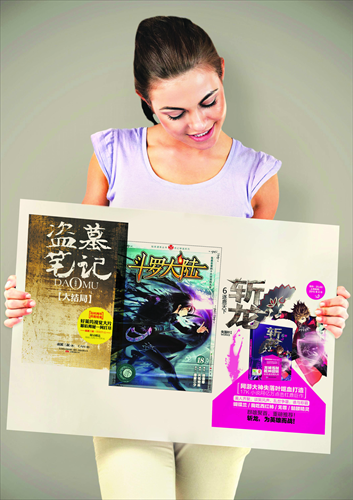Thanks to foreign translators, China’s thriving online lit scene is heading overseas

Thanks to recent growth in the number of online forums devoted to translating Web novels into English, China's online literature has seen major growth in overseas popularity. Photo: IC
The first Chinese Web novel that Indonesian university student Yohanna ever read was Zhan Long (Cutting Dragon, published in hard copy in 2013), which was one of the first of its kind translated into English. The novel, which is based on a video game, tracks the adventures of young characters as they traverse different lands, complete with elements of action, fantasy, romance and the supernatural.
That's all it took - Yohanna was immediately hooked.
"When I was reading, I felt so happy, desperate to read more," she said. Yohanna, an information systems major, is in her senior year of university in Singapore, where she learned to speak both English and Chinese.
For Yohanna, part of the appeal of online novels is that there are no limits placed on the imagination. "I prefer reading books in the fantasy or virtual reality game genres," she said, adding that "English-language readers seem to prefer fantasy in the Chinese context."
In the past decade, online literature has seen explosive development in China, leading to the rapid growth of several Web novel sites and dozens of writers whose online works have earned them fame and millions of yuan a year. More recently, overseas readers have also begun joining this "big book club," which has led to a new phenomenon - flourishing forums dedicated to translations of Chinese Web novels.

Many foreign readers say they have become hooked on Chinese Web novels thanks to their strong, imaginative plots and vast range of genres. Photo: IC
Exploring a range of genres
Emphasizing the fun plots, Yohanna pointed out that there are a range of Chinese Web novel genres that cater to every taste. "There are a lot, fantasy, wuxia (martial arts), xianxia (martial arts blended with Taoist magic), xuanhuan (fantasy featuring adventures and wars) and so on."
Yohanna is especially into "light novels," a genre of serialized short fiction for young adults that emerged in Japan as an extension of pulp magazines. According to Yohanna, they are particularly well-suited to foreign readers like herself. "[Novels of other types] often use complicated language, but light novels are quite simple, as they are written by amateurs."
Yohanna started out reading Japanese light novels translated into English, which in turn led her to discover Chinese light novels. To her surprise, there were scores of them, many of which had already been translated into English.
Already an avid fan, Yohanna began visiting different translation sites, anxiously awaiting updates. Later, she decided to take the matter into her own hands and start her own website, shiroyukitranslations.com, where she uploads light novels that she has translated, chapter by chapter. Each chapter, she said, often receives tens of thousands of hits.
Popularity isn't a given though; Yohanna says, there are several standards your work must meet. "First of all, you have to release it frequently, at least four to five times a week. Secondly, the work should have fresh ideas; it should be something different."
The most popular novel she's translated to date was Zhaohuan Wansui (Long Live Summons). "This is different from the rest of the novels out there, because you can only read so many virtual reality novels about some guy training to become stronger," she says. "Summoning is a new category."
The unique charms of 'pop' fiction
Though snobs may dismiss Web novels as mere pulp fiction, Yohanna believes they have their own unique charms that are no less than that of the classics.
One reason is that they are free and easy to access.
She also believes the Chinese elements in many of these novels have proved attractive to many overseas readers, including the frequent use of online memes and jokes or passing remarks related to Chinese culture. For example, the main character in one novel she is working on likes to impress the ladies by saying that he wrote all the classic Chinese poems himself - and since he's a time traveler, he is able to get away with it.
Felicia Yan, a high school student from Seattle, is one of a growing number of American readers of Chinese Web novels.
So far, Yan, who is Chinese-American, has read the original versions of Lang Ya Bang (Nirvana in Fire), The Legend of Zhenhuan, The Disguiser and several other novels. All of these have been made into popular Chinese TV series that have even made it overseas, which is one way foreign readers learn about these novels.
However, she considers these books more than simple pop culture fodder, citing Lang Ya Bang as an example.
"It is not just about personal power or benefits, but friendship, loyalty, as well as the greater good of the people," she said. "I really enjoyed reading the novel, as it brought forth many emotions that I think are common for all of us today."
As an example, she cites Prince Jing, who is loyal toward another character, Mei Changsu, despite his bias against him. "It continues to inspire me to become someone who holds friendship, teamwork, loyalty, and all the other virtues we see in Lang Ya Bang highly."
The community of a subculture
Chinese-Canadian student Stanley Zhang, 20, first started reading Chinese Web novels in 2010, starting with the classic The Adventures of Three Tomb Raiders (Gui Chui Deng).
Zhang, who studies psychology and Japanese in Tokyo, has a special area of interest: "BL" (or "Boys' Love") literature, which is a genre that originated in Japan and is dedicated to romantic or sexual relationships between male characters.
Though it's usually written by and for women, Zhang, who is bisexual, is a big fan, and since 2013, estimates he has translated 638,038 Chinese characters of BL fiction into 429,585 English words.
He posts primarily on a forum called "Chinese BL Translations," for which he is an administrator.
According to Zhang, a majority of the readers of his website are from the US, and many come from Malaysia and Indonesia as well.
"I was very surprised and proud when I realized that many people [from overseas] love to read these novels."
Sometimes, readers make requests, asking Zhang to translate certain novels that they hear are good, or from a well-known writer of the community, or to finish translating a project that was dropped halfway through.
According to Zhang, people start reading Chinese Web novels for different reasons. Some are very interested in Chinese culture, while others get interested because they are familiar with certain subcultures, such as the BL fiction community.
Cultural ambassadors
On top of his personal interest in the genre, Zhang has another ambition behind his translation work - to show that Chinese culture has advanced beyond the outdated picture that most of the world has of a traditional, conservative people.
"I want to let people know that Asian youth have their own interpretations of diversity. I want people to learn more about our Chinese culture."
Another major forum, wuxiaworld.com, shares a similar motivation.
"[I want to] serve as a bridge to bring aspects of Chinese culture, legends and stories to the Western world," said the Chinese-American owner of the website, who goes by the penname "Ren Woxing," after a character from a wuxia classic The Smiling, Proud Wanderer.
Ren, 30, is a former diplomat and certified translator who resigned from his job working for the US government about six months ago to focus on the website.
Founded in December 2014, wuxiaworld.com is the largest Chinese Web novel translation forum in the world, boasting nearly 3 million page views each day. Its more-than-200,000 users hail from over 150 countries across the world, and it boasts 14 translation teams, each working on a project of their own. The teams are a mixture of Chinese, Singaporeans, Chinese-Americans and foreigners who have been studying Chinese for years.
Ren began the work over a decade ago by translating traditionally published wuxia novels. Foreign readership, however, was small. "These novels are very quintessentially Chinese, and comparatively harder for foreign readers to get into," he said.
Fortunately, along with the development of online literature over the past few years, international translators have also become exposed to modern Chinese Web novels, especially those of the xianxia and xuanhuan genres, which, Ren said, have served as a turning point for Chinese Web novels' overseas popularity.
These genres contain many magical elements, a number of which are borrowed from Western fantasy, making them more accessible to Western readers, Ren said.
For example, Coiling Dragon, which spans more than 800 chapters, all translated by Ren, features a continent of saints, immortal beings of unimaginable power, spells, swords and magical beasts.
"I'm not sure if this is a 'golden age' for Chinese Web novels [overseas] yet, but I would describe this as the start of a huge surge in interest in them," Ren said. He added that the size of Chinese Web novel readership is still much smaller than that of Japanese novels and non-Asian novel readership too, so there's still a long way to go.
Newspaper headline: Novel reads